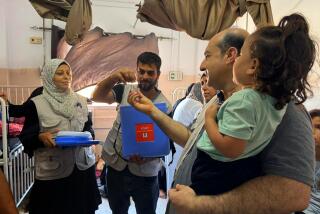Gates Foundation donates $255 million to fight polio
- Share via
In one of its largest grants ever, the Bill and Melinda Gates Foundation donated $255 million Wednesday toward the push to eradicate polio, a goal that has eluded world health agencies for decades but that many still consider doable, possibly within five years.
Microsoft co-founder Bill Gates made the announcement of the grant to Rotary International at a meeting of the service organization in San Diego. The World Health Organization, in collaboration with other groups, has spent 20 years and $6 billion trying to eradicate the polio virus, aided by $600 million raised by Rotary members. The 2000 target for elimination set in 1988 is already eight years overdue.
The number of countries in which the virus is still endemic has dropped since 1988 from more than 125 to four -- Nigeria, India, Pakistan and, to a lesser extent, Afghanistan. These four countries accounted for 1,488 of the 1,625 polio cases reported in 2008.
Fifteen other countries in Africa and Asia that once had eliminated the disease reported a total of 137 cases after the virus was reintroduced by travelers or immigrants.
Dr. Bruce Aylward, director of the WHO polio eradication program, estimated that it would cost $2 billion to stamp out the last traces of the virus in areas where wars, natural disasters, difficult terrain, extreme poverty and political interference have kept it stubbornly entrenched.
Without eradication, the virus will continue to find unprotected children, said Dr. Stephen L. Cochi of the national Centers for Disease Control and Prevention. Should nations eventually tire of funding mass vaccination campaigns, mathematical models have shown that infections would quickly soar to 200,000 a year.
“The very point of eradication is to go that last mile, or the disease comes roaring back,” Cochi said.
Polio is caused by a highly infectious virus that invades the nervous system. Most of those infected do not become ill, but one in 200 develop an irreversible paralysis, usually in the legs, that can set in within hours of infection. Of these, 5% to 10% can survive only with a ventilator because their breathing muscles become paralyzed.
Gates, who has contributed millions toward eliminating malaria, said that a victory over polio would energize other global health efforts, in the same way that the 1977 elimination of smallpox did. Eradicating the smallpox virus remains a unique medical accomplishment.
“The kind of energy that came out of the smallpox success and that will come out of the polio success will keep global health on the agenda,” Gates said after the Rotary meeting.
“We have the tools and the strategy, and we’re getting very close,” Gates said. The money is to be parceled out over five years.
Rotary International, which has members in 170 countries, made ending polio its priority in 1985. Its efforts persuaded the WHO to set eradication as a goal. The group already has matched more than half of a $100-million challenge grant that the Gates Foundation donated in 2007, and will match another $100 million of the new grant.
The Global Polio Eradication Initiative is a partnership of Rotary International, the WHO, the United Nations Children’s Fund and the CDC. On Wednesday, Germany and Britain announced new funding for the effort. The United States is the initiative’s largest donor, giving about $133 million a year.
--
More to Read
Sign up for Essential California
The most important California stories and recommendations in your inbox every morning.
You may occasionally receive promotional content from the Los Angeles Times.













